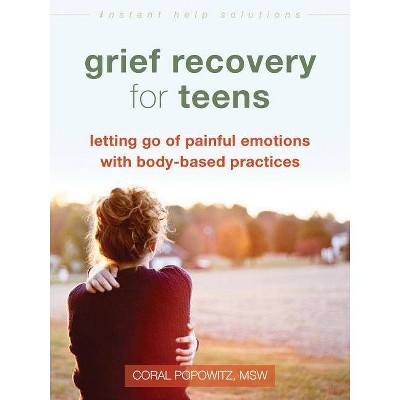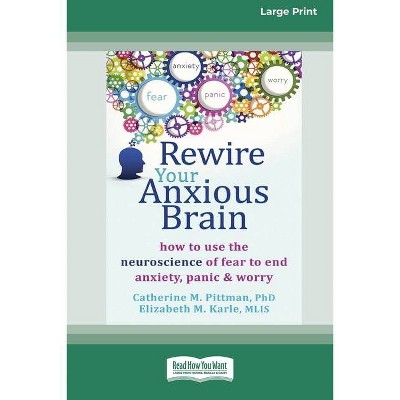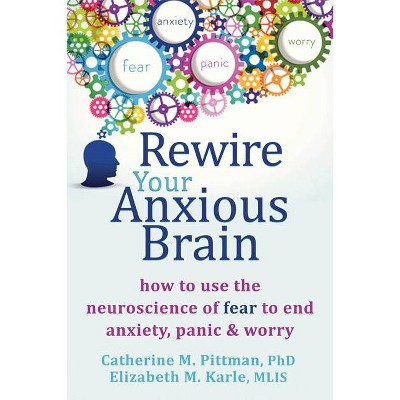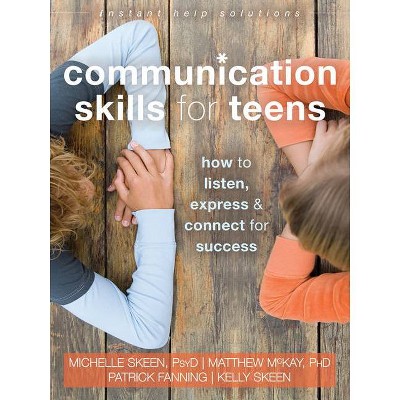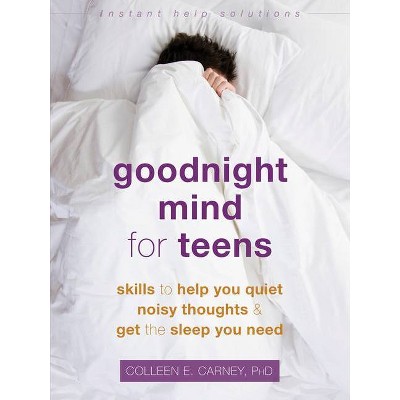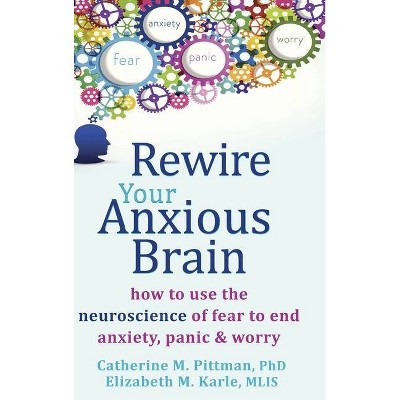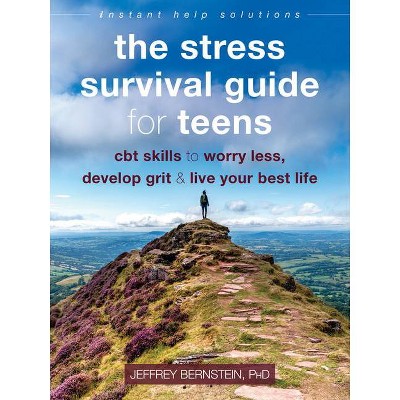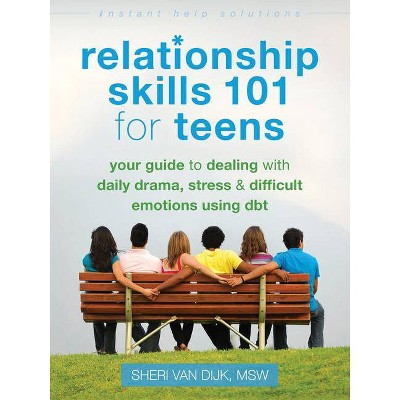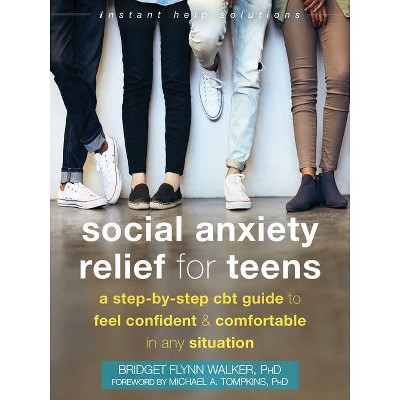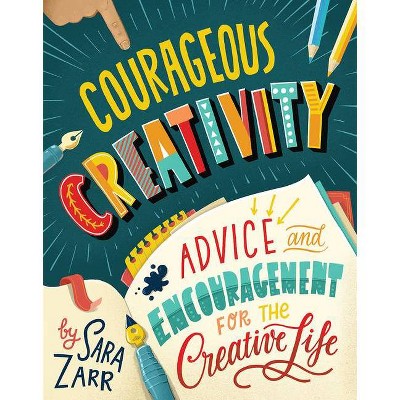Rewire Your Anxious Brain for Teens - (Instant Help Solutions) by Debra Kissen & Ashley D Kendall & Michelle Lozano & Micah Ioffe (Paperback)
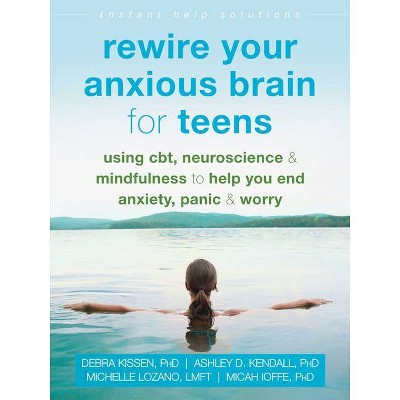
Similar Products
Products of same category from the store
AllProduct info
<p/><br></br><p><b> About the Book </b></p></br></br>Anxiety is a huge problem among today's teens--that's why teens need tangible tips and tools they can use every day to manage fears, stress, and worry. In <i>Rewire Your Anxious Brain for Teens</i>, four anxiety specialists offer practical and essential skills grounded in cognitive behavioral therapy (CBT), neuroscience, and mindfulness to help teen readers "rewire" their anxious brain and get back to living their lives.<p/><br></br><p><b> Book Synopsis </b></p></br></br><p><b>It's time to retrain your brain! In this go-to guide for teens, four anxiety experts offer tangible tips and tools you can use every day to rewire your anxious brain; manage fears, stress, and worry; and get back to living your life.</b></p><p>When you're feeling anxious, it can seem like the whole world is crashing in around you. Your heart starts racing, your thoughts feel jumbled, and you may feel like something terrible is going to happen, or worse. You aren't alone. In fact, millions of teens experience anxiety. The good news is that there are proven-effective tools you can use now to take control of your anxiety so you can focus on the stuff you love. This book will guide the way.</p><p>Drawing on powerful cognitive behavioral therapy (CBT), neuroscience, mindfulness, and acceptance commitment therapy (ACT), this book will show you the ten most effective methods for "rewiring" your anxious brain. You'll learn: </p><ul><li>How to calmly observe your anxiety</li><li>What feeds your anxiety, and how you can "starve" it instead</li><li>Guided meditations for overcoming anxious thoughts</li><li>Strategies to help you balance your emotions when fears and worries show up</li><li>How to deal with uncertainty, perfectionism, and procrastination</li></ul> <p>Most importantly, you'll learn that you are <i>stronger </i>than your anxiety, and you have the power to take control of your fears. Let's face it--being a teen today is stressful and sometimes scary. But if you're ready to put anxiety in its place and start focusing on the things that matter to you the most, this much-needed guide can help get you started.</p><p/><br></br><p><b> Review Quotes </b></p></br></br><br>"There are many books about teen anxiety, but this guide is approachable, informative, and empowering. The authors take on the role of coaches, and the book is designed as a 'mind gym, ' with 10 chapters filled with exercises for rewiring the brain to move past anxiety and emotional pain, end self-recrimination, defeat procrastination, and be more present, confident, and resilient. The authors clearly know their audience. There is an effective mix of neuroscience, relatable examples of teens responding to emotional discomfort, and an array of tools, including online worksheets. VERDICT: Although some readers may show resistance to doing the actual work offered in this book, the strategies, offered by seasoned professionals, suggest new perspectives on anxiety not only for teens but for stressed parents who might pick it up." <br> --<b><i>School Library Journal</i></b>--School Library Journal<br><br>"This workbook for teens suffering from anxiety offers lessons, examples, and exercises. Ten chapters instruct readers in rewiring their brains in various ways to reduce or eliminate the limitations imposed by symptoms of anxiety on daily life. The chapters address self-denigrating thoughts, staying in the present moment, coping with emotional pain, developing resilience, recognizing negative biases, handling intense emotions, moving past procrastination and avoidance, developing confidence, and consolidating gains over the long term.... Readers will learn how symptoms of anxiety stem from useful bodily responses gone awry as well as many useful thoughts and actions to interrupt their anxiety. Practical, challenging, informative--positively worthwhile." <br> --<b><i>Kirkus Reviews</i></b>--Kirkus Reviews<br><br>"<i>Rewire Your Anxious Brain for Teens </i>is a refreshing approach to helping young people understand anxiety and how to master it. By often offering two examples of teens with anxiety at a time, the reader is able to clearly see the difference between skillful and unskillful approaches to anxiety. Rather than talk down to teens, the authors appeal to teen skepticism with credible reasoning backed by science. The book is full of practical see-for-yourself exercises with easy-to-understand explanations of how these new skills literally impact the brain. I learned a lot that I wish I had known when I was a teenager." <br><b>--Jon Hershfield, MFT</b>, director of The OCD and Anxiety Center of Greater Baltimore, and author of <i>When a Family Member Has OCD </i>and<i> Overcoming Harm OCD</i>--Jon Hershfield, MFT<br><br>"<i>Rewire Your Anxious Brain for Teens </i>is an excellent resource for teens who want to conquer anxiety. Packed with useful tools and practical suggestions, the authors bring together the best of cognitive behavioral therapy (CBT), neuroscience, and mindfulness in a clearly written, comprehensive workbook. Read this book, practice the strategies within, and you <i>will</i> rewire your brain!" <br><b>--Kevin L. Gyoerkoe, PsyD</b>, director of The Anxiety and OCD Treatment Center in Charlotte, NC; and coauthor of <i>10 Simple Solutions to Worry</i>--Kevin L. Gyoerkoe, PsyD<br><br>"As I read the book, I automatically thought of many of my own patients who could benefit from the exercises and examples presented in it. The exercises show young people how to relieve themselves of negative and futile self-judgements. Instead, alternatives are offered to guide a teen on an optimistic, self-directed journey toward mastery of troubling anxiety by literally 'rewiring' an anxious brain. Most teens will easily be able to see themselves in the examples, and gain a more realistic understanding of anxiety. They will also see that following the exercises will ultimately result in greater self-esteem." <br><b>--Judith T. Davis, PhD</b>, president of Performance Development Associates, and psychologist in private practice--Judith T. Davis, PhD<br><br>"For teens experiencing the challenge of anxiety, this book is a treasure trove of valuable tools, presented in an effective and easy-to-understand style. <p/> What makes this book especially valuable for teens is the format: the reader is prompted and encouraged to bring powerful tools on board through specific exercises, many of which take only a few minutes. <p/> Specific tools empower the reader to: <ul><li>understand and befriend the experience of anxiety</li><li>become a 'positive coach' for oneself</li><li>practice mindfulness and meditation</li><li>build resilience</li><li>learn to 'dial down' intense emotions</li><li>overcome procrastination</li><li>enhance one's ability to focus and to move toward fulfilling goals</li><li>overcome social anxiety"</li></ul><b>--Neal Sideman</b>, self-help advocate, internationally known coach and teacher for people recovering from anxiety disorder, member of the Anxiety and Depression Association of America (ADAA) and cochair of the ADAA Public Education Committee--Neal Sideman<br><br>"Researchers know more about the processes that produce anxiety disorders in the human brain than they do about any other disorders. This should be the best news for teens suffering from anxiety disorders, but the problem is, can the average teenage anxiety sufferer <i>understand</i> the brain processes that need to be changed in order to overcome an anxiety disorder? Based on over one hundred combined years of working with anxious teens, these authors have put together an amazing book that not only explains the anxious brain in language a teen can understand, but also provides exercises and strategies that give teens the resources they need to change their brains in order to have needed control over their anxiety. With clear examples and explanations, the book pulls readers in, preparing them to engage in the process of taking charge of their lives. This book is a dream come true for anxious teens and the therapists who help them. It will change millions of lives." <br><b>--Catherine M. Pittman, PhD, HSPP</b>, coauthor of <i>Rewire Your Anxious Brain</i>, and professor in the department of psychology at Saint Mary's College in Notre Dame, IN--Catherine M. Pittman, PhD, HSPP<br><br>"There are many good informational sources to help teens decrease stress, worries, and anxiety. This one stands apart in its recognition that habitual trouble with anxiety resides in the ways your brain seeks to protect you, rather than some flaw in your personality or being. It also stands out for its creation of ten simple and specific ways you can retrain your brain, much as you might use specific exercises to retrain your abdominal muscles. If you're looking for a guide which offers CBT exercises to coach you to a path of less anxiety, here it is!" <br><b>--David Carbonell, PhD</b>, author of <i>Panic Attacks Workbook</i>, <i> The Worry Trick</i>, <i> Fear of Flying Workbook</i>, and <i>Outsmart Your Anxious Brain</i>--David Carbonell, PhD<br><br>"This book was truly a pleasure to read. The authors did a tremendous job of explaining the relationship between the brain and anxiety in very user-friendly language. The inclusion of exercises throughout the book provided a hands-on opportunity to begin using the strategies discussed. I would highly recommend this book." <br><b>--Brian J. Schmaus, PhD</b>, clinical psychologist at the Anxiety Treatment Center of Greater Chicago--Brian J. Schmaus, PhD<br><p/><br></br><p><b> About the Author </b></p></br></br><p><b>Debra Kissen, PhD</b>, is CEO of Light on Anxiety CBT Treatment Center. Kissen specializes in cognitive behavioral therapy (CBT) for anxiety disorders, and has a special interest in the principles of mindfulness and their application for anxiety disorders. She is coauthor of <i>The Panic Workbook for Teens</i>, and is an active contributor to <i>HuffPost</i>, where she regularly shares information on the empirically supported treatment for anxiety and related disorders. Kissen is cochair of the Anxiety and Depression Association of America (ADAA) Public Education Committee. She often serves as a media psychologist, and is available for press inquiries. <p/><b>Ashley D. Kendall, PhD</b>, is a clinical psychologist who conducts NIH-funded research on mental health treatment for teens, and specializes in treating anxiety- and stress-related disorders in teens and adults. She received her PhD in clinical science from Northwestern University. Kendall is particularly interested in combining CBT with mindfulness-based techniques to help people overcome anxiety, stress, anger, and depression. <p/><b>Michelle Lozano, LMFT</b>, is a marriage and family therapist at Lutheran Social Services of Illinois, with placement at John H. Stroger, Jr. Hospital at Cook County in Chicago, IL. Lozano belongs to the ADAA, and the American Association of Marriage and Family Therapy. She has guest lectured at Loyola University Chicago, as well as The Graduate School at Northwestern University, on working with the patient's family system in therapy. Lozano provides family and group therapy to children and adolescents with chronic medical conditions in an effort to improve their emotional well-being and overall health. She is particularly interested in providing patients with the education and tools to become their own mental health coach to live more fulfilling lives. <p/><b>Micah Ioffe, PhD</b>, is a clinical psychologist who specializes in the treatment of youth anxiety disorders. She earned her PhD in clinical psychology from Northern Illinois University, with an emphasis on child and adolescent development. Ioffe utilizes both CBT and acceptance and commitment therapy (ACT) in her work with teens to help them move through anxious moments feeling empowered, fulfilled, and brave.</p>
Price History
Price Archive shows prices from various stores, lets you see history and find the cheapest. There is no actual sale on the website. For all support, inquiry and suggestion messages communication@pricearchive.us

